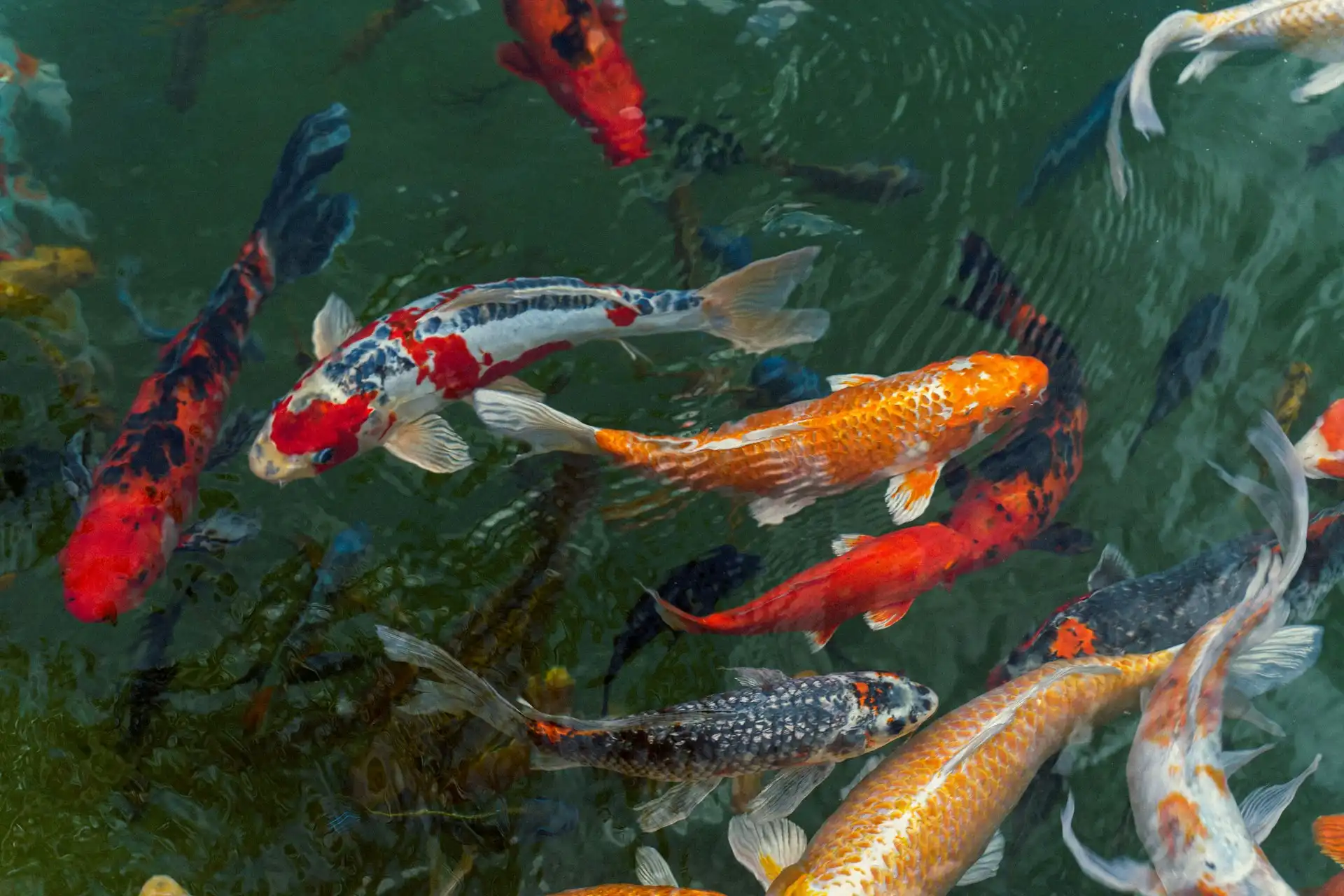
01 Jul Be Careful of Where You Purchase Koi
At Aquatic Gardens, we understand that introducing new koi into a pond is more than a hobbyist purchase—it is a critical decision that affects pond health, regulatory compliance, and environmental stewardship. Selecting a koi supplier without rigorous protocols can lead to devastating disease outbreaks, genetic degradation, chemical imbalances, legal penalties, and ecological disruption. We outline below the key criteria every Southern California koi pond owner must evaluate before purchasing koi.
1. Vendor Biosecurity and Disease Prevention Protocols
Koi herpesvirus (KHV) and bacterial pathogens such as Aeromonas and Flavobacterium can decimate entire populations. We require our suppliers to:
- Maintain Certified Quarantine Facilities: Separate incoming stock for a minimum of thirty days in biosecure isolation units equipped with UV or ozone sterilization.
- Adopt Strict Water Recirculation Controls by Using closed-loop systems with pathogen filtration to prevent cross-contamination between batches.
- Conduct Routine Health Screenings: Implement polymerase chain reaction (PCR) testing for KHV, carppox virus, and bacterial assays before release.
A supplier lacking these measures risks introducing subclinical infections that may not manifest until after integration when eradication becomes impossible.
2. Genetic Lineage and Quality Assurance of Koi Strains
Genetic integrity ensures vibrant coloration, predictable growth, and disease resistance. We verify:
- Pedigree Documentation: Suppliers must provide lineage certificates that trace stock at least three generations back, confirming the pure strains of Kohaku, Sanke, Showa, and Shusui.
- Phenotypic Assessment Protocols: Regular evaluation of fry under standardized lighting and feeding regimes to identify deformities or color flaws early.
- Selective Breeding Records: Documentation of broodstock performance metrics—such as growth rate (cm/month) and survivability under stress tests—to guarantee robust offspring.
Without transparent genetic records, owners risk acquiring koi that are prone to weaknesses or recessive defects, which can compromise their long-term health and aesthetics.
3. Water Chemistry Compatibility and Source Testing
Introducing koi acclimated to one water profile into a pond with divergent parameters leads to osmotic shock. We mandate:
- Comprehensive Water Analysis: Measurement of pH (ideal 7.0–8.0), general hardness (GH), carbonate hardness (KH), ammonia, nitrite, and nitrate in both the supplier’s facility and the buyer’s pond.
- Custom Acclimation Protocols: Gradual mixing schedules to adjust koi to differences in temperature and mineral content, minimizing gill and kidney stress.
Failing to match water chemistries may precipitate fungal blooms, weakened immune responses, and mass mortality events.
4. Transportation Stress, Quarantine, and Acclimation Practices
Fish endure significant physiological strain during transport. We enforce:
- Low-Density Packing: Maximum stocking densities of 1 kg of fish per 5 L of water, enriched with oxygen and anti-stress electrolytes.
- Controlled Temperature Shipping: Insulated containers maintain a temperature range of ±1 °C (18–22 °C) to prevent thermal shock.
- On-Site Quarantine Upon Arrival: A secondary isolation period in the owner’s facility, combined with prophylactic dip treatments (e.g., 30 ppm formalin bath) and repeated health assessments over 14 days.
Skimping on quarantine exposes existing pond inhabitants to dehydration, organ damage, and latent infections.
5. Reputation, Certification, and Licensing of Koi Suppliers
Southern California has strict biosecurity regulations governed by the California Department of Fish and Wildlife (CDFW) and the U.S. Fish and Wildlife Service (USFWS). We verify that suppliers hold the following:
- CDFW Aquaculture Facility Registration: Ensures adherence to state-mandated health and record-keeping standards.
- USFWS Import Permits (if stock originates outside the U.S.): Guarantees compliance with federal wildlife import controls.
- Aquaculture Certifications: Third-party audits, such as GlobalGAP or USDA Process Verified Programs, confirm best-practice implementation.
Purchasing from unlicensed dealers can result in fines, confiscation of the pond, and forced depopulation.
6. Legal Compliance and Southern California Import Regulations
Interstate and international transfers of live fish are subject to quarantine and permit requirements. We assist owners by:
- Handling Permit Applications: Preparing and submitting all necessary CDFW and U.S. Department of Agriculture documentation.
- Coordinating Inspection Appointments: Scheduling health inspections at arrival to prevent sample hold-ups.
- Maintaining Traceability Logs: Recording batch numbers, dates of shipment, and test results for at least five years, as required by California law.
Non-compliance exposes owners to legal action and disrupts the ornamental fish trade.
7. Environmental Impact and Invasive Species Risks
The unauthorized release of non-native Cyprinus carpio into local waterways poses a threat to native fish, amphibians, and riparian ecosystems. We commit to:
- Education on Bio-Containment: Providing protocols to prevent accidental drifts from overflow or deliberate release.
- Disposal Guidelines: Safe euthanasia and disposal methods for unwanted koi, per CDFW mandates.
- Support for Conservation Programs: Partnering with local agencies on habitat restoration to minimize ecological imbalance.
Selecting a responsible supplier helps protect Southern California’s biodiversity and water quality.
8. Warranty, Return Policies, and After-Sales Support
Quality assurance extends beyond the sale. We offer:
- Health Guarantee Periods: Minimum 30-day mortality coverage with clear terms for replacements or credit.
- 24/7 Technical Hotline: Immediate advice on disease symptoms, water parameter anomalies, and treatment protocols.
- Scheduled Maintenance Plans: Optional service contracts for pond water testing, filtration tuning, and seasonal adjustments.
A weak or non-existent policy leaves owners without recourse when issues arise, amplifying financial and emotional costs.
To safeguard pond health, ensure legal compliance, and protect local ecosystems, koi pond owners must procure fish from a supplier whose protocols meet the highest industry standards. At Aquatic Gardens USA, we integrate stringent biosecurity, genetic verification, water-chemistry matching, and full regulatory support—backed by comprehensive warranties and expert after-sales service. For peace of mind and flourishing koi ponds, purchase your next koi directly through Aquatic Gardens USA.



